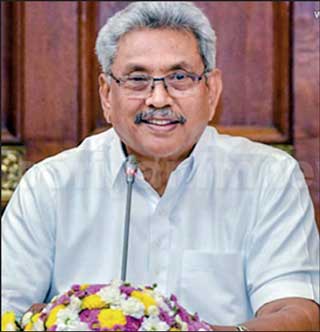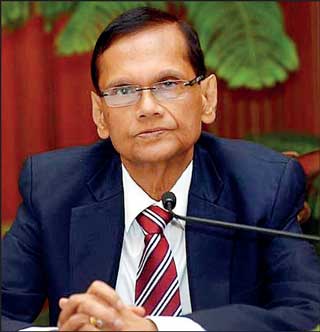Monday Feb 16, 2026
Monday Feb 16, 2026
Wednesday, 1 December 2021 00:00 - - {{hitsCtrl.values.hits}}
Government commences engagement with civil society on Prevention of Terrorism Act reform
 |
| President Gotabaya Rajapaksa |
 |
| Ministerial Subcommittee on amending the Prevention of Terrorism Act Chairman Foreign Minister Prof. G.L. Peiris
|
The Ministerial Subcommittee on amending the Prevention of Terrorism Act met with members of the Sri Lankan Collective for Consensus (SLCC) recently to discuss the current state of their proposals. SLCC consists of
individuals drawn from civil society organisations that have reconciliation, human rights and peace building aims in their work.
Chairman of the Subcommittee, Foreign Minister Prof. G.L. Peiris said there was no draft legislation as yet to share but only a set of proposals which they wished to discuss with civil society and other groups. He stated that there would be no repeal of PTA as there is a continuing need for it due to security issues. He explained there was a need for balance between personal liberty and freedom and the need for national security.
The noteworthy amendments described in the verbal presentation made by Prof. Peiris consisted of the following:
1. Detention orders: The period of validity of a detention order would be reduced from 18 months to 12 months
2. Restricted use of PTA: The IGP has issued clear instructions to police officers not to have recourse to the PTA as a regular mode of arrest or as a short cut. The norm should be to investigate with the use of the normal law. They should only use PTA in exceptional circumstances when adequate evidence is found in investigation and if national security issues arise in the process of investigations
3. Supervision by magistrates: It will be mandatory for magistrates to visit the place of detention and to personally ensure the welfare of detained persons. The Human Rights Commission should/will be informed of such detention. Magistrates will be empowered to direct the IGP to investigate if any evidence of torture is found. In such a situation the Attorney General will institute criminal proceedings
4. Judicial oversight: The person detained will have access to judicial appeal through Article 126 of the constitution (Fundamental Rights jurisdiction of Supreme Court) and Article 140 (Writ jurisdiction of Appeal Court). This will be spelled out in the law so that there is no ambiguity. This will be the first time in the four-decade-long history of PTA that detention orders can be legally challenged
5. Access to lawyer: The person detained will have the right to access a lawyer and to visits by family members. This will be a statutory right so that there is no discretion in the matter
6. Repeal of Section 14 of PTA: This prohibits publication of any statement made by the detainee or with regard to the investigation
7. Speedy trial: Trials of PTA cases will take place on a daily basis until completed to avoid delays. The Chief Justice has already directed that PTA cases should be expedited
8. Advisory Board: This has been set up under Section 13 of the PTA. Chaired by retired Chief Justice Asoka de Silva it has already recommended the release of 26, 8 and 6 prisoners on three occasions. The Advisory Board is expected to make recommendations and advise the President on the investigation, release, granting of bail and future action related to the persons imprisoned over terrorist activities and detained under detention orders
Prof. Peiris explained that the changes to PTA proposed were a result of consensus between the Ministries of Foreign Affairs, Justice and Defence and the Attorney General’s Department; these changes are not conceived as one-off ones, but as a part of a continuum, there being other changes contemplated that will be agreed on later. He also assured that changes in legislation will be rapid, and take place early next year.
No written documents were provided to the SLCC either before or during the meeting. However, SLCC presented a position paper of our own to the ministerial subcommittee which provides the principles underlying and restraining the PTA which SLCC wishes to have incorporated into the amended PTA.
On its part, among others, SLCC highlighted the following:
1. Arbitrary arrests need to be ended. An example was given from Batticaloa where 10 civilians including a mother of two had been taken under PTA for commemoration of their dead relatives.
2. The period prior to indictment should be considered under the normal law, and hence the judicial officers had power to bail out detainees, as decided in the Pathmanathan case by the Supreme Court and magistrates to be apprised accordingly
3. When detainees are sent to other districts on remand there is lack of communication and cross checking which can be rectified by video links for communication
4. All actions with regard to detention need to be judicial rather than executive or administrative
SLCC is mindful that as being briefed by the Ministerial subcommittee on 27 November, family members and others who sought to commemorate Martyrs Day of fallen LTTE cadres were being forcibly prevented by the security forces and arrests and assaults took place. SLCC therefore stresses the importance of national reconciliation taking place in a larger environment that is respectful of human rights.
SLCC expressed appreciation of the subcommittee’s initiative to engage with a group of CSOs at this briefing session. SLCC looks forward to further discussions once the government legislation had emerged in a draft form. It also requested the subcommittee to engage with other CSOs which had evinced much keenness to do so. Chairman of the subcommittee Prof. G.L. Peiris invited interested CSOs to make written submissions without delay to the subcommittee for consideration.
The Sri Lanka Collective for Consensus (SLCC) statement was signed by Ven. Kalupahana Piyaratana, Prof. T. Jayasingam, Rev. Asiri Perera (Retired President/Bishop), Prof. Tudor Silva, Rev. Fr. C.G. Jeyakumar, Hilmy Ahamed, Rohana Hettiarachchi, V. Kamaladhas, Dr. Joe William, S. Wimalagunarathna, Dr. Dayani Panagoda, Visaka Dharmadasa, Dr. Jehan Perera, Javid Yusuf and Sarah Arumugam.
The SLCC, a group of individuals drawn from multiple sectors of society, religion, academia, and non-governmental organisations, has presented the following set of principles and guidelines to assess the proposed draft legislation of Prevention of Terrorism Act. SLCC which is committed to a Sri Lanka that is founded on ideals of pluralistic coexistence, human rights, and justice, will propose further amendment or repeal based on options suggested and available.
The PTA had been contested and commented upon as far back as its origin itself. It began as a temporary provision but has stayed in effect for more than 40 years with its ‘temporary provision’ intact. Over time many clauses have been added via gazette notifications that were not in the original act.
1. The power that the PTA placed at the disposal of the executive has been something no government since has been willing to give up.
2. The revision should be this in accordance with the norms of prevention of terrorism to be found in other countries yet upholding the democratic principles and safeguarding human rights.
Listed below are some salient features of the PTA that needs revision and without which change in the PTA would not be meaningful.
a) The Act must be within the Constitution and cannot violate its provisions including Fundamental Rights, as the constitution itself is the supreme law of the country.
i. The Supreme Court has to review the document for constitutional flaws even if there is a two-third majority in the parliament as it is the citizen’s rights that makes the constitution and a mere two-third majority cannot bypass that.
b) Judiciary cannot be taken as subservient to the executive in issues relating to justice to people.
i. all actions need to be judicially executed and within the existing provisions of the Criminal Procedure Coe except in places where the act specifically deviates. Arbitrary arrests, excess detention, detention in private places, unlimited detention, refusal for bail, etc. needs to be removed
ii. Remand has to be within the Judiciary based on the facts and law and not at the request of the Executive and security forces. Powers of the magistrates and others need to be documented.
iii. Detention by political personnel (the Minister) needs to be disallowed as this had caused unjust detentions.
iv. The decisions of the Supreme Court seem to be ignored even when highlighted by the attorneys of the accused viz. arrest beyond PTA, request for bail before indictment etc. seems to be ignored and needs to be included in the law.
c) Political power should not be utilised for the Judicial actions.
i. Detention orders and extension of same needs to be a judicial action and not political or executive
ii. Maximum detention period without charges has to be strictly limited, legal action needs to be strictly emphasised, avoiding decades in remand and then released with no action.
iii. The general clause ‘if done with good intention there may not be any charges on them individually’ needs to be revised as those responsible need to answer of a person had been remanded wrongly, sometimes for several years.
iv. Families of detainees and their rights to visitation need to be guaranteed
v. Any form of violence and torture needs to be outlawed and effective monitoring mechanisms need to be put in place.
d) The right of a citizen should be considered as supreme at all times and treated as innocent until proven guilty and the onus of proof should always be on the prosecution, state or otherwise.
i. All existing safeguards should be operative and those that specially seek exemption needs time limits and definite statements for same.
ii. Judicial orders need to be obtained for all acts of detention.
iii. The treatment of a citizen as innocent until proven guilty is non-negotiable!
e) Regulations that affect the constitutional provisions may not be accepted as that alters the principles or the legislation itself. Regulations should be only to expand and explain the provision of the act and not introduce another concept on its own.
i. Provision by regulations to allow accused in custody in private locations other than in control of prisons lead to torture and fatality and needs to be prevented.
ii. Provisions for the sentence/punishment should be by law and by the judiciary and not be by executive fiat or any other.
f) The effect of the interpretation ordinance, Criminal procedure, Civil procedure, Judiciary process should be underlying principles and should not be violated by the regulations or the act itself.
i. All provision of the other laws/provisions that protect the rights of the citizens would be and should be active unless specifically denied with reasons and for limited period and supervised by the Judiciary itself.
g) Citizen must always have redress to judiciary at all times
i. Every accused should have access to lawyer of their choice and Judiciary at all times for them to seek release or question the charges or punishment as it may be.
h) The act to be in accordance with the international guidelines and procedure for acceptance globally.
i. This is essential for international relations and for democracy at large
i) These provisions of PTA are generally applicable only during a period of emergency, and as such this must be validated only for a period of time and needs to be revisited every three years keeping the principles intact.
j) Make the presence of a woman police officer mandatory when arresting and/or body searching a woman so that her dignity and safety is better protected. The presence of a woman police officer is also mandatory when detaining a woman overnight.